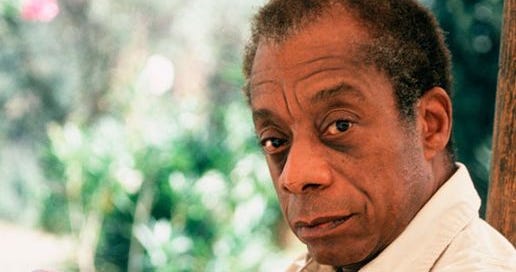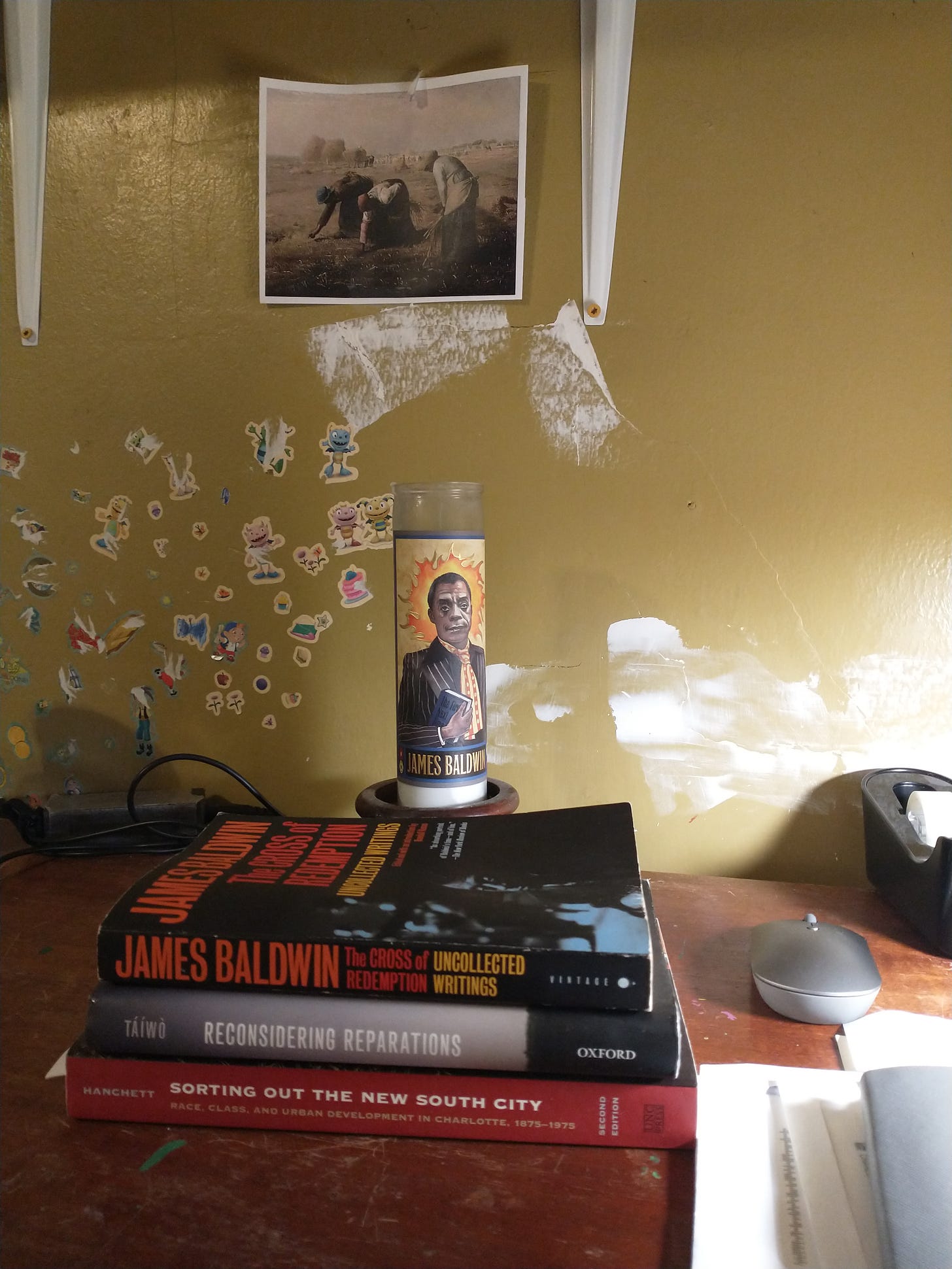I first read James Baldwin about a decade ago, in my early 30s, around the same time I was beginning to understand that writing was becoming a part of my vocation. I had waited far too long, a combination of poor choices and miseducation. From the first moments I was taken. The power of the prose, the long, winding sentences with every word and punctuation mark in just the right place, the stunning moral and political vision, the prophetic rage, and the stunning tenderness all pulled me into an obsession that has not yet ended. My starting point was The Fire Next Time, a work I still read multiple times per year.
Baldwin echoes in my head each time I open my notebook or computer to write. As I sat down at my desk daily to work on the book, Baldwin was always nearby:
[Pictured: Baldwin candle by The Unemployed Philosophers Guild. Art by Millet and my children.]
Today (Wednesday, August 2) marks the Baldwin’s 99th birthday. As I begin to publish more regularly on this Substack, one of my intentions is to offer some of the work behind what made it to the page—people, influences, stories that didn’t make the cut—alongside some brand new work building on my regular themes of race, place, and faith. Below is a briefly annotated collection of Baldwin’s work that has stuck with me. Before that list, though, one organizing thought that has pervaded my work over the last five years or so, since I first encountered it. From the essay “As Much Truth as One Can Bear:”
“What the writer is always trying to do is utilize the particular in order to reveal something much larger and heavier than any particular can be…. Our particulars are not very attractive…, but we must use them. They will not go away because we pretend they are not there.”
My work focused intensely on a single plot of land in Charlotte and several generations of occupants on it. Chanequa Walker-Barnes’s powerful foreword (subscribe now for a preview later!) to the book opens like this: “This is not just a North Carolina story….” That is exactly what I hoped to communicate across the entire work. I hope I’ve done my work well.
The very next line in “As Much Truth as One Can Bear” is one of Baldwin’s most famous: “Not everything that is faced can be changed; but nothing can be changed until it is faced.”
Books:
The Fire Next Time. For those wanting to read Baldwin, my favorite place to start. This short book begins with an open letter to Baldwin’s nephew and namesake. Commenting on his nephew’s birth, he says, “here you were: to be loved, baby, hard, at once, and forever, to strengthen you against the loveless world.” Tenderness mixed with fire the whole way through.
No Name in the Street. The post-Civil Rights Era response to The Fire Next Time includes a short but powerful recollection on attending Martin Luther King, Jr.’s funeral, an extended set of personal reflections on the injustices of the criminal legal system, several paragraphs on Charlotte’s Dorothy Counts, and much more. One highlight: while writing about his flight away from the US to live in France during the 1950’s, Baldwin notes how freeing it was to be ignored—to be “left completely alone.” He writes, “for a [B]lack boy who had grown up on welfare and the chicken-shit goodwill of American liberals, this total indifference came as a great relief and, even, as a mark of respect.”
You can find both of these short books published in this larger collection.
A Short Story: “Sonny’s Blues.”
The story of an unnamed protagonist and his brother Sonny in 1950s New York City. Sonny becomes a first-rate jazz pianist, and at the same time wrestles through addiction and recovery. Baldwin writes as compellingly about music and musicians as anyone does.
This story is easily available online in .pdf formats.
An essay collection: The Cross of Redemption: Uncollected Writings. The following are a few essays from inside that collection.
“On Being White… and Other Lies.” Powerful truths in the way that only Baldwin could spin them out. “And have brought humanity to the edge of oblivion: because they think they are white. Because they think they are white, they dare not confront the ravage and the lie of their history….”
“The Price May Be Too High.” In this short essay, Baldwin considers the intertwined fate of Black and white artists.
“The Uses of the Blues.” He writes, “there’s always something a little funny in our disasters, if one can face the disaster. So that it’s this passionate detachment, this inwardness coupled with outwardness, this ability to know that, all right, it’s a mess, and you can’t do anything about it… so, well, you have to do something about it.”
“We Can Change the Country.”
The opening paragraph is stunning every time you read it: “Before I say anything else, I have an announcement to make. I want all of you, and your wives and your children and your brothers-in-law and everyone you know, to resolve as of this moment that you will buy no presents for Christmas. And when I say no presents, I mean not a nail file, not a toothbrush, and I want you to tell your children, as of this moment and on Christmas Day, that the reason there is no Santa Claus this year is because we have lost the right—by the murder of our brothers and sisters—to be called a Christian nation. And until we regain that right, we cannot celebrate the birth of the Prince of Peace. And I am very serious about this for two reasons: (a) morally I think this nation should be, for the foreseeable future, in mourning; (b) one must face the fact that this Christian nation may never have read any of the Gospels, but they do understand money.”
As the old folks say, “Great day in the morning!”
(There’s a lot missing here, including Baldwin’s fiction and poetry. Always more to read.)
One personal essay: I had a chance to write about James Baldwin and Urban Renewal for Sojourners. I’m waiting for it post and will update with a link when it does.
Book News: The manuscript for Our Trespasses is complete. The book is due out February 20, 2024. I can’t wait for you to see it. Coming up around August 20th, I’ll have two big things: a look at the cover and a pre-order link. Pre-orders are super important for authors and publishers, so I’ll encourage you to purchase before the release date.
One last note: August 2 is also the birthday of percussionist Billy Kilson. It’s always a good day to check out his work with the Dave Holland Quintet.





Thanks to you , I have read some of these, but not enough! I will fill in those gaps! You describe his writing perfectly.